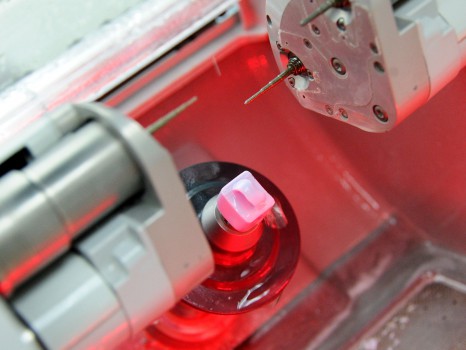Science
Nanotechnology Enabled Drug Delivery to Influence Future Diagnosis and Treatments of Diseases
Nanotechnologies in Drug Delivery Congress organized by Markets and Markets Conferences is gathering industry experts from the nano-medicine market who will look at these developments and also present new ideas. Supported by the French Society for Nanomedicine, the congress will be held on 27 - 28 April 2015 in London, UK. Speaking at the congress will be AstraZeneca, Nemaura Pharma, Lloyds Register Quality Assurance, Cytoviva, World Nano Foundation, King's College London, Institute for Biological and Medical Imaging, Uppsala University and University of Oxford among others.
- Read more
- 290 reads
First proof of isolated attosecond pulse generation at the carbon K-edge

This image shows an attosecond emission steering with CEP phase.
- Read more
- 372 reads
Nanodevice Invented in Iran to Detect Hydrogen Sulfide in Oil, Gas Industry

- Read more
- 305 reads
Nanotechnology Raises Possibility to Produce Strongest Commercial Pure Aluminum Alloy

- Read more
- 334 reads
NASA’s SOFIA Finds Missing Link Between Supernovae and Planet Formation

SOFIA data reveal warm dust (white) surviving inside a supernova remnant. The SNR Sgr A East cloud is traced in X-rays (blue). Radio emission (red) shows expanding shock waves colliding with surrounding interstellar clouds (green).
- Read more
- 327 reads
New Tech = Faster, Better Dental Work

The Computer Aided Design and Computer Aided Machining fabricator designs a molar for tooth restoration on Joint Base Andrews Dec. 1, 2014.
- Read more
- 365 reads
Clean energy future: New cheap and efficient electrode for splitting water

A scanning electron microscope image shows the porous structure of the nickel foam used to make UNSW Australia's inexpensive and efficient oxygen-producing electrode. The foam has holes in it about 200 micrometers across (Scale bar is 200 micrometers)
- Read more
- 310 reads
Data structures influence speed of quantum search in unexpected ways: Highly connected structures don't always support fastest quantum computing

Quantum search slows unexpectedly on the highly connected data structure represented by this graph. Mathematical description: a 5-simplex with each vertex replaced with a complete graph of 5 vertices.
- Read more
- 316 reads
Nano piano's lullaby could mean storage breakthrough

Arrays of gold, pillar-supported bowtie nanoantennas can be used to record distinct musical notes, in this case, "Twinkle, Twinkle, Little Star."
- Read more
- 333 reads
UK skies set to dim in decade’s deepest solar eclipse

The partial phase of the total eclipse of 2006, rotated to match the appearance of the March 2015 eclipse from the south of England.
- Read more
- 406 reads
Human Rights
Fostering a More Humane World: The 28th Eurasian Economic Summi

Conscience, Hope, and Action: Keys to Global Peace and Sustainability

Ringing FOWPAL’s Peace Bell for the World:Nobel Peace Prize Laureates’ Visions and Actions

Protecting the World’s Cultural Diversity for a Sustainable Future

Puppet Show I International Friendship Day 2020

